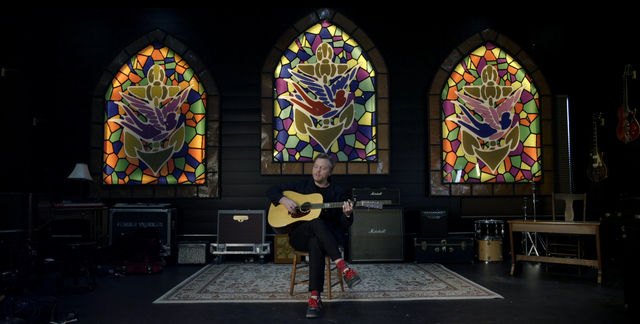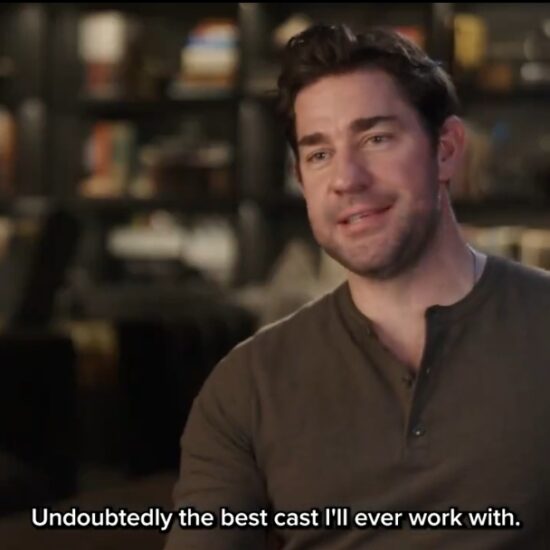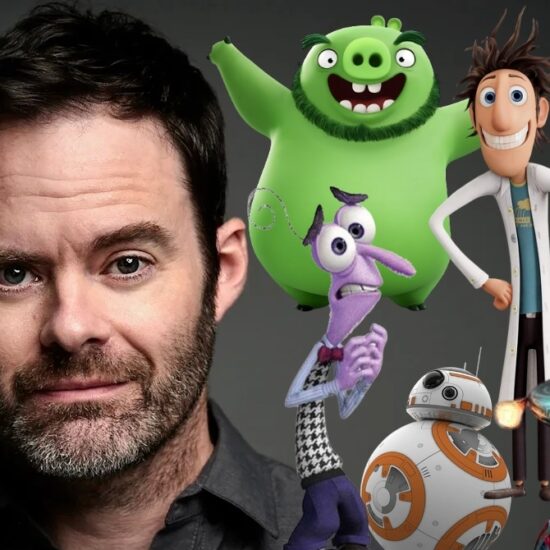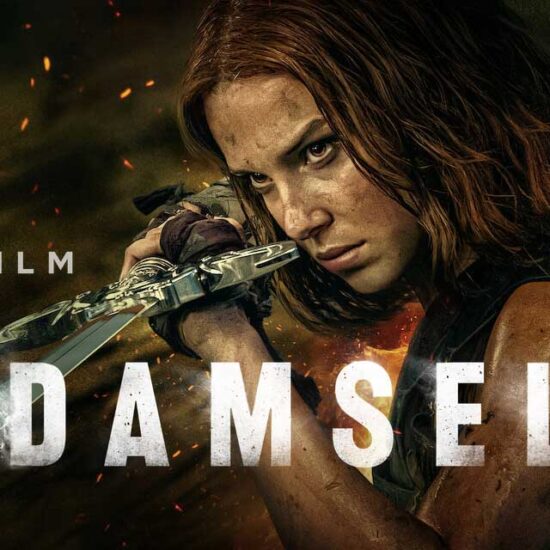
In 2002, director Sam Jones made what is widely considered a benchmark for 21st century music documentaries with “I Am Trying to Break Your Heart: A Film About Wilco,” a movie that lucked into just about all the subject matter that could make B-roll footage of the making of an album into A-list material. It had conflict within the band, between an auteur and another member of great talent; conflict with the soon-to-be-ex-record label, over the basically unwanted classic-to-be “Yankee Foxtrot Hotel”); and said auteur doing his own demon-wrestling, outside foils notwithstanding.
Now, it’s easier to see that Jones’ good fortune in happening upon all that wasn’t all luck. More than 20 years later, Jones has come up with another gold-standard music doc, in the form of “Jason Isbell: Running With Our Eyes Closed,” newly streaming on HBO Max. This time, as the creation of another amazing record — Isbell’s “Reunions” (recorded in late 2019 and released a few months later) — is put under the filmic microscope, there are no record-company bookkeepers as unseen baddies in the backdrop to a making-of. Major labels and the conflicts that come with them are so 2002, right? But one common thread is intra-band tension… as it probably will be in most good rock docs now or 20 years from now. It gets more interesting than that, though. In this instance, the difficult vibes are between bandmates who double as a married couple — Isbell and his fiddler-spouse, Amanda Shires. Here, unlike the by-now iconic beefing between Jay Tweedy and Jay Bennett, we know no one’s ultimately going anywhere, right?
Or are they? No one expresses too clearly to the camera in the moment exactly how badly things are going on the personal front, as the recording or some of the most meaningful rock material in recent years seems to more or less move along like gangbusters. But after we see some cutting and/or possibly passive-aggressive remarks shared between husband and wife, the next thing we know, producer Dave Cobb is suggesting that Isbell try out some material at home — and the singer lets slip that “home” that night will be the local Omni. (This isn’t elaborated on in the film, but in real life both members of the couple had at least one night spent in a hotel room.) Later, Shires picks up her iPhone and reads an email letter that she wrote to her husband at their bottom during this time, half matter-of-fact, half heart-wrenching. Suddenly it seems like anything might be possible, even a split between the much-celebrated king and queen of Americana-leaning rock.
The ending is never really in doubt, which maybe is why it’s more satisfying than it ought to be to see the marrieds at the movie’s center squabble, with firm evidence of their mutual fierce emotional intelligence and empathy, knowing there’s likely to be something instructive about it. There’s a scene partway through the 2019 studio footage that flashes ahead to some shared time Isbell and Shires had on stage at a 2020 Walt Disney Hall gig, smack between the wrap-up of the album and the start of the pandemic. In the middle of one song, Shires throws Isbell a mid-verse wink that goes unseen by everyone but the camera, and he offers a slight smile back. It’s hard to think of a more heart-warming moment in the history of the movies this year where strictly visual cues say: This is harder than anyone around us knows, and we’re gonna get through it — and it’s all our secret.
Moving back into the album-making material, Jones eavesdrops on some of the deaths-by-papercuts that can make a marriage go wrong, which just happen to express themselves in an artistic context. Shires takes it as something deeper than a passing comment that he says her violin is too loud. Meanwhile, Isbell’s not happy at the way that his wife, a great singer-songwriter in her own right who happens to have a masters in creative writing, wants to red-pen some of the grammar in the lyrics to the doc’s title song, which he already slaved over. These scenes speak as much to marital strife as musical differences, but also to the editor/writer relationship: It’s sad — but, honestly, just a little more amusing for us than it had to have been at the time — to see a couple that might be fraying around the edges ramp up tension over deeply held positions about usage of the past or present participle in a song lyric. (Isbell is hardly concerned with grammatical rightness in his lyrics, himself: He quips that his audience is “not out there dancing, so I’ve got to get my prepositions right.”)
Jones’ film is not just “Scenes From a Marriage” with a literally harmonious ending, although that relationship stuff is certainly some of the movie’s most compelling. Here’s a fact: Shires is as much of a natural movie star as Isbell is. (We’ll see how some of that plays out when he is seen in his dramatic film debut in Martin Scorsese’s “Killers of the Flower Moon,” coming out in October.) The camera loves not just their faces but their mutual mixture of sweetness and acerbic thorniness. Shires comes off as the kind of open book you want to leave open; Isbell seems like he wants to make it his mission to be that transparent, just in the an artistic/empathic deal he’s made with his audience, if nothing else, though he can’t help but be a slight bit more difficult to crease. “Sometimes he needs a lot of space,” she says, as they sit for a joint interview. “You’re goddam right,” he responds. “I’m a man from Alabama, for Christ’s sake.” It sounds like he’s making a self-effacing joke — and if you know his funny Twitter persona at all, he is! — but that doesn’t mean he won’t cut off the interview to go outside in a few seconds.
The doc is hardly all focused on this relationship; there’s too much interesting Isbell backstory that brought Jones to the project in the first place. The director does a terrific job of finding the songs or lyrics that relate most to the tales he wants to put on screen, and one of these has to do with “Dreamsicle,” one of the highlights of the “Reunions” album, and as great a song as the singer-songwriter genre has produced in the last few years. Isbell jokes that the producer, Cobb, who isn’t so focused on lyrics as sound, “still thinks it’s about ice cream.” Actually, it’s pretty specifically about his experience as the child of parents in the midst of deciding to divorce (both mom and dad are bravely interviewed on screen). There’s darling footage home-video footage of a possibly pubescent Isbell — now a modern-day guitar hero — showing off his growing shredding acumen on “Sunshine of My Love.” It’s less darling when he says he took up guitar to drown out the sound of his parents fighting. (That might almost be the oldest story in the world.) A line in “Dreamsicle” about broken glass turns out not to have been random or abstract: Everyone recounts how he threw a baseball through a window when even the electric guitar could no longer mask the marital strife that was driving him crazy.
The present-day marital story does figure into that sequence, premonitorily; what child of divorce, like Isbell, doesn’t wonder how or if they’re going to do it better? But before it really gets back to their marriage, “Running With Our Eyes Closed” moves on to territory many fans may be most curious to see. That would be his hard-drinking years, which are increasingly tough to watch as more video evidence is put on screen, though they went into Isbell being what he partly is today — an un-sanctimonious symbol of recovery among rock ‘n’ rollers. (“Cover Me Up,” his signature song, has just one line about getting sober, but it’s become the biggest line of his career.) There’s sufficient coverage of the years in which Isbell blossomed into a baby-faced alcoholic as a member of the great band Drive-By Truckers, including candid accounts from that group’s leader, Patterson Hood, who repeats the oft-told irony about just how much of a liquor-soaked mess one had to be to get kicked out of Drive-By Truckers. Isbell is a few years into his solo career, and a little bit into his second marriage, to Shires, before he goes into treatment … preceded by one last blowout show in which he got drunker than he’d ever been on stage. Manager Traci Thomas lent her secret DVD of that night to Jones, saying she’d always held it in her archives in case a relapse called for a “Scared Straight” moment, and that footage makes its ugly — but fascinating — premiere here.
The third act more or less takes as its theme their relationship in recovery, without quite letting on just how much danger it ever was or wasn’t in; a marriage, like a woman, has gotta keep some secrets. It’s also about the boredom of the pandemic, which may not be the subject every viewer is most eager to revisit in a documentary right now. The film could have gone off the rails as a documentary because Jones had to resort to sending the couple high-def cameras to shoot their own monologues, alongside the remote press he was doing to promote “Reunions,” to finish out the film project. (It does not go far into the future; the new album Isbell has coming out this June was not yet a gleam in anyone’s eye when filming wrapped.) Happily, they re-bonded, somehow, over quarantine frustrations, unlike the couples they’re well aware of whose problems became exacerbated by being mutual shut-ins. They sure would be delighted by each other’s company, ultimately … even in, or especially in, the concentrated doses a pandemic demanded.
The subtitle of the movie almost feels like a misnomer, although it nicely echoes the title of that track of Isbell’s. Whatever else you might say of Isbell, or Shires, in the best or worst of times, proceeding with closed eyes doesn’t feel like a problem. The doc could almost have a different subtitle, taking a cue from the Wilco film: “We Are Trying to Mend Our Hearts.” You might actually feel it doing a small reparation job on yours.














